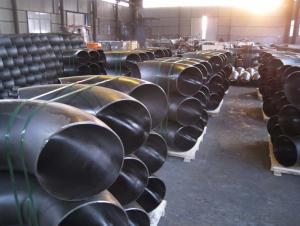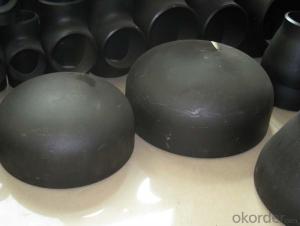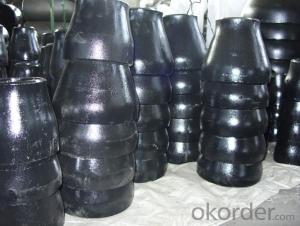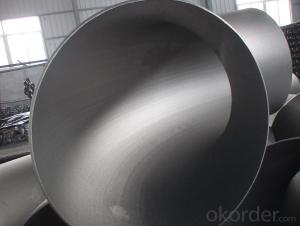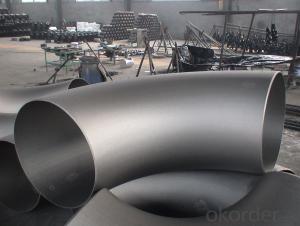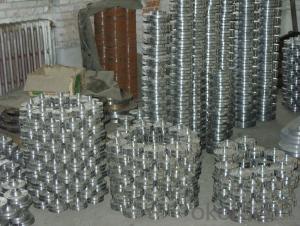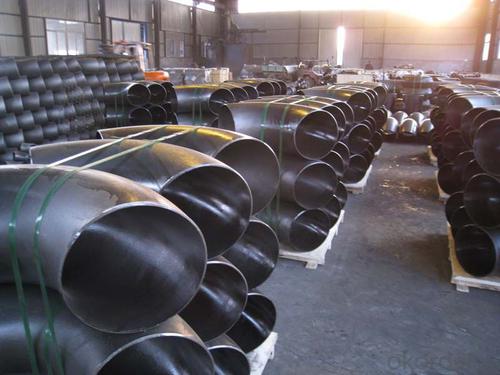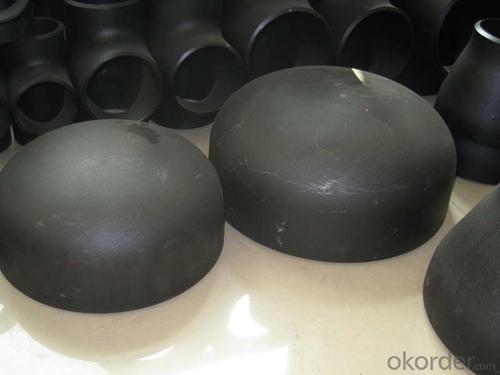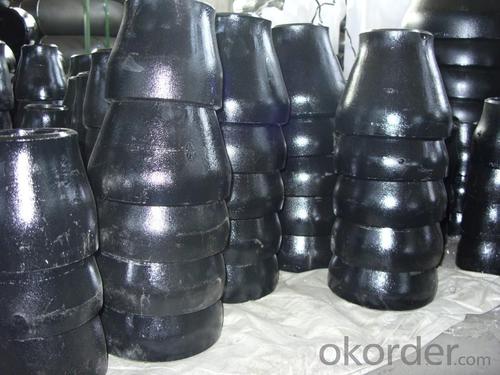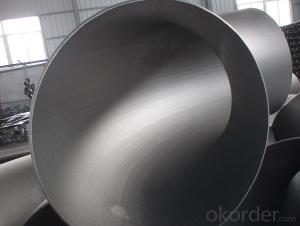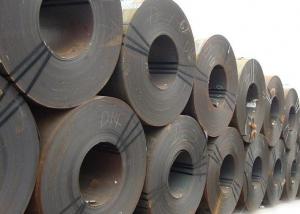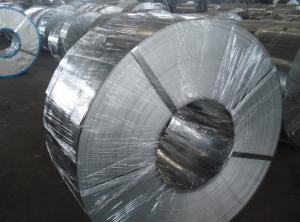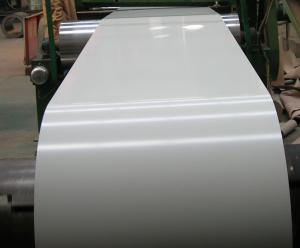Carbon Steel Pipe Fittings SA105 BEND
- Loading Port:
- China Main Port
- Payment Terms:
- TT OR LC
- Min Order Qty:
- -
- Supply Capability:
- -
OKorder Service Pledge
OKorder Financial Service
You Might Also Like
Specifications
pipe fitting elbow
Certificate:ISO:9001-2000
New material,completely meet asme and din standard
Best price
1. type: AISI ASTM A234 WPB BW Con Elbow
2. Size: 1/2"-48"(1/2"-24"is seamless and 26"-48"is welded)
3. Wall thickness: sch10-160, STD, XS, XXS
4. Material: A234WPB, A420WPL6, A420WP5, WP11, WP12, WP22, etc
5. Welding line: seamless
6. Angle of bend: 30, 45, 90, 180degree
7. Bending radius: SR, LR
8. Standard: ANSI B16.9, JIS, SB, DIN, GB
9. Surface treatment: black paint, vanis paint, black rust-proof oil,
transparent oil, hot galvanizing
10. Application: petroleum, electricity, chemical, natural gas, metallurgy,construction,
shipbuilding and other fields because of its high pressure, high temperature, etc
11. connection: welding
12. technics:forged
13.Certificate:ISO9001 - 2000, CE, SGS, etc.
14. packaging: wooden case, pallet, container or in accordance with the
requirement of customers
15. Principle: quality fist, customer first, credit first
16. payment: L/C T/T
17. delivery time: 7-25 days after payments
18. Notes: the bevel can be made in accordance with the special requirements
of the customers
19. Others: we can also produce the products according to the requirements
of the customers
The main production:
1. PIPE FITTINGS: elbows, tees, bends, reducers, cap, flanges and sockets etc.
2. PIPE: bult welded pipes, seamless pipes, threaded pipes, etc.
We sincerely welcom customers at home and abroad to visit us and seek common development.
- Q: How is steel used in the energy sector, such as in power plants?
- Steel is used extensively in the energy sector, particularly in power plants, due to its strength, durability, and heat resistance properties. It is used in the construction of power plant infrastructure, such as the framework, supports, and beams, as well as in the fabrication of turbines, boilers, and transmission towers. Steel's ability to withstand high temperatures and pressure makes it ideal for containing and transporting steam or other fluids, allowing for efficient energy generation and distribution within power plants.
- Q: How do steel products contribute to the transportation and logistics sector?
- Steel products play a significant role in the transportation and logistics sector by providing strength, durability, and versatility. Steel is commonly used in the construction of vehicles, such as cars, trucks, trains, ships, and airplanes, due to its high tensile strength and impact resistance. It ensures the safety and reliability of these vehicles, enabling them to carry heavier loads and withstand harsh environmental conditions. Additionally, steel is used in the infrastructure of transportation systems, including bridges, railways, and ports, ensuring their stability and longevity. Overall, steel products are essential for enhancing the efficiency, safety, and sustainability of the transportation and logistics sector.
- Q: What are the maintenance and care requirements for different steel products?
- The maintenance and care requirements for different steel products vary depending on their specific use and environment. However, in general, steel products require regular cleaning to remove dirt, dust, and other debris. This can be done using mild soap and water, followed by thorough drying to prevent moisture-related issues. Additionally, applying a protective coating or paint can help prevent corrosion and extend the lifespan of the steel. It is also important to inspect steel products regularly for any signs of damage or wear, and address them promptly to avoid further deterioration. Overall, proper maintenance and care play a crucial role in preserving the appearance and functionality of steel products.
- Q: How is steel plate rolled for improved thickness accuracy?
- Steel plate is rolled for improved thickness accuracy through a process called cold rolling. In this method, the steel plate is passed through a series of rollers that gradually reduce its thickness, ensuring a uniform and precise thickness across the entire plate. Additionally, the use of advanced control systems and measurement techniques during the rolling process helps to further enhance the accuracy of the thickness.
- Q: What are the different types of steel scaffolding and support systems available?
- There are several different types of steel scaffolding and support systems available, including tube and clamp scaffolding, system scaffolding (such as cuplock and ringlock scaffolding), frame scaffolding, and shoring systems. Each type has its own unique features and advantages, allowing for various applications and requirements in construction and maintenance projects.
- Q: How do steel products contribute to the oil and gas industry?
- Steel products play a crucial role in the oil and gas industry by being used in various applications such as pipelines, drilling equipment, storage tanks, and offshore platforms. The durability, strength, and corrosion resistance of steel make it ideal for these demanding environments, ensuring the safe and efficient extraction, transportation, and storage of oil and gas resources.
- Q: How is steel used in the production of process equipment for chemical plants?
- Steel is commonly used in the production of process equipment for chemical plants due to its high strength, durability, and resistance to corrosion. It is used to fabricate various components such as tanks, reactors, pipes, and valves, ensuring they can withstand harsh chemical environments and high-pressure conditions. Additionally, steel can be easily welded and shaped, allowing for custom designs and efficient manufacturing processes in the production of process equipment for chemical plants.
- Q: How is steel used in the production of playground equipment?
- Steel is commonly used in the production of playground equipment due to its strength, durability, and ability to withstand harsh outdoor conditions. It is used to construct frames, supports, and other structural components of swings, slides, climbing structures, and various playsets. The use of steel ensures the safety and longevity of playground equipment, making it a vital material in their production.
- Q: How can steel products be protected from corrosion?
- Steel products can be protected from corrosion through various methods such as applying protective coatings like paint or zinc, using galvanization or electroplating techniques, implementing cathodic protection, or utilizing corrosion inhibitors.
- Q: What are the uses of steel in the construction of shopping malls and retail centers?
- Steel is extensively used in the construction of shopping malls and retail centers due to its exceptional strength and durability. It provides structural support for large open spaces, allowing for flexible and customizable designs. Steel beams and columns are also used to create intricate facades and can support the weight of multiple floors. Additionally, steel is fire-resistant, ensuring the safety of occupants. Overall, steel plays a crucial role in creating safe, functional, and visually appealing shopping environments.
Send your message to us
Carbon Steel Pipe Fittings SA105 BEND
- Loading Port:
- China Main Port
- Payment Terms:
- TT OR LC
- Min Order Qty:
- -
- Supply Capability:
- -
OKorder Service Pledge
OKorder Financial Service
Similar products
Hot products
Hot Searches
Related keywords
